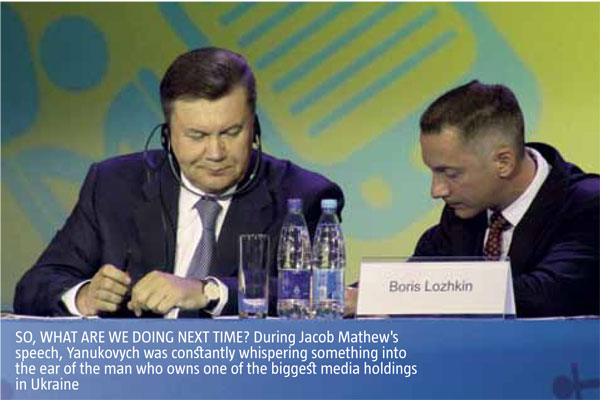The fourth Ukrainian President has already become a person not to shake hands with (or not even to greet from a distance) for a number of Western politicians. Those who continue to communicate with the Ukrainian leader generally do so because of official necessity, but keep it to a minimum. Against such a background, the efforts of the Ukrainian Ministry of Foreign Affairs and government-controlled media resources to deny obvious facts and search for all possible pretexts to argue “the absence of isolation” of the current guarantor, Mr. Yanukovych, appear somewhat comic. In this sense, Mr. Yanukovych’s last visit to the 67th session of the General Assembly of the United Nations in New York was quite revealing.
For example, one of the main mouthpieces of the current government, Rinat Akhmetov’s Segodnia daily newspaper announced it as follows: “This is the third time that the President is participating in the main UN forum, but overall, this is his fifth visit to the USA as the head of state…. Although visits to the USA are not a rarity for Mr. Yanukovych, this one is of great significance. However it is true that the issue at hand is the possibility to have one-on-one talks on political and economic issues with the leadership of the USA and the IMF, rather than the General Assembly itself (although according to our information, a meeting is planned with the Secretary General of the UN, Ban Ki-Moon).” These are the means by which the impression is created of the remarkable international activity of Mr. Yanukovych “as a regular” occurrence, his ability “to resolve issues” with the heads of leading countries and international organisations. “What isolation can you be talking about ” — is the question for which the mass reader is programmed.
However, the reality is something completely different. Immediately prior to the visit, the US Senate approved a resolution — more harsh than the documents of this kind issued by European institutions (PACE and the European Parliament). The resolution condemns the “politically motivated persecution and imprisonment” of Ms. Tymoshenko; warns that “the continued detention of Ms. Tymoshenko threatens to jeopardize ties between the United States and Ukraine” and calls on the State Department to impose sanctions, initially in the form of a ban on issuing visas to “those responsible for the imprisonment and illegal treatment of Ms. Tymoshenko and more than a dozen political leaders, connected to the Orange Revolution of 2004”. This is the first instance of the approval of such a document by a legislative body of a specific country, which has not yet happened in Europe. The Resolution was approved after the former Secretary of State, Condoleezza Rice, demonstratively ignored Viktor Yanukovych during the recent YES meeting in Yalta.

The desperate attempts of the Ukrainian Ministry of Foreign Affairs to convince us that the Resolution was supposedly merely approved due to a questionable procedure emphasize even more the desperate corner into which the Yanukovych regime has painted itself. It is well-known that such expectations were also expressed to the last, as regards Angela Merkel on the eve of the EURO -2012, however, the issue ended with the German side switching from ever more transparent hints to the frank formulation of the assessment of the Yanukovych regime as a “dictatorship” and such, that is conducting political repression.
Another manifestation of the inadequacy of the Ukrainian Ministry of Foreign Affairs, was the attempt to devaluate the significance of the Resolution, particularly when Oleh Voloshyn, the Director of the Information Policy Department of the Ministry of Foreign Affairs states that “the difference between the approved document and the actual implementation of any restrictions on the issue of visas is so vast, that we should just wait and see”. If this is to continue to be the reaction to ever more transparent hints on the part of the USA, then Ukraine can expect that closer to the New Year, the US will also resort to undisguised statements at all levels, following the German example, and even sanctions.
At least business in Ukraine is already aware of the serious implications of the continued worsening of relations with its Western partnersif the Ukrainian government fails to change its stand, or if there is no change of the government itself. More specifically, Bradley Wells, an analyst at Concorde Capital investment company recently stated that he does not believe that the Ukrainian government will react duly to the US Senate Resolution, since “the current functionaries are simply too ossified”. However, if there are no changes, “both the EU and the USA will carry out their threats and apply severe sanctions against Ukrainian officials”. And this, of course, will also influence the investment climate in Ukraine, as well as the prospects for currency-financial stability.
“The elections will come to an end — new, restored relations will begin with many countries of the EU and the USA ,” declared Viktor Yanukovych in New York. The West has similar expectations. The problem only lies in the fact that each of the parties has its own view of the process for the normalization of relations. If “there” a condition for the rebooting of relations is seen as the rejection by the Yanukovych regime of the usurpation of power and the marginalization of the political opposition, public organisations and an independent mass media in Ukraine, then “here”, it appears that the government is counting on attaining an absolute (ideally a constitutional) majority in parliament during seemingly democratic elections and the strengthening its positions in relations with foreign partners. Thus, realistic improvements in relations between Ukraine and the civilized world will most likely only be possible after a change of government in Ukraine.

